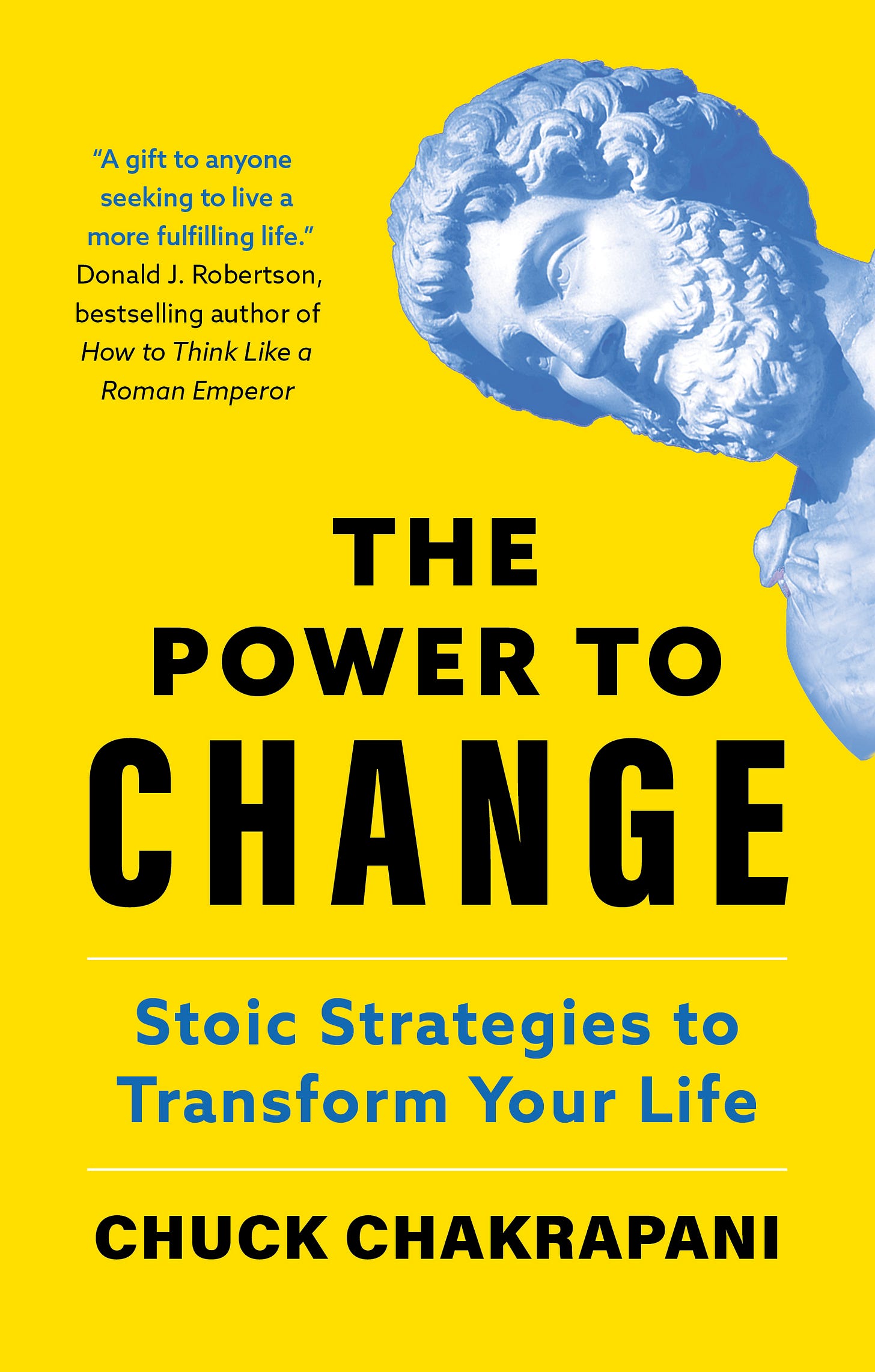The Power to Change: Stoic Strategies to Transform Your Life
An excerpt from Dr. Chuck Chakrapani and John Murray Press
PAC would like to express great thanks to Dr. Chuck Chakrapani and John Murray Press for this excerpt from the newly released The Power to Change: Stoic Strategies to Transform Your Life.
Being Impeccable
How to make your life a work of art
THE ILLUSION OF PERFECTION
Perfectionism paralyzes us. We almost complete things but don’t finish them because we are unsure if they are perfect. We stop ourselves from doing things because we won’t be perfect enough. We postpone things indefinitely because we are unsure we can do them perfectly. We demand perfection from others, and it drives them crazy.
Yet when I hear statements like:
- “Don’t expect her to finish anytime soon. She is a perfectionist!”
- “My boss is so demanding because he is such a perfectionist.”
- “I wish I could be as perfect as my mentor.”
I hear a tinge of admiration. Many of us have been taught to be perfect: to be a perfect son or daughter, a perfect student, a perfect teacher, a perfect employee, a perfect neighbor, or a perfect citizen. Some people spend an enormous amount of time and energy making things “perfect” because being perfect is “good.” We were told it is something we should all strive for.
But what is perfection? If we examine it, we will see that our concept of perfection is mostly based on others’ opinions. How can we be perfect if others don’t think so? We may think that what we did was perfect until someone disagrees. Then, it is not perfect.
Can we really be perfect? You can work out all you want to get a perfect body, but it will lose its beauty and strength as you age. You can do all you want to be a perfect friend to everyone. Yet, someone will find you offensive. You can do all you want to be a perfect spouse, but your spouse may disagree. None of us experience a perfect life—no matter how wealthy we are, no matter how healthy we are, no matter how wise we are, we cannot escape illness, old age, sorrow, humiliation, pain, or death.
Perfection doesn’t exist in nature. Things are constantly in flux.
Consider that before long, you will be nobody and be nowhere, nor will any of the things that you now see or any of those who are now alive exist. Nature’s law is that all things change and turn, and pass away, so that in due order different things may come to be.
Marcus Aurelius, Meditations 12.21
What perfection can exist in a universe where no sooner than something appears, it disappears? What perfection can we aim for in a kaleidoscopic universe? Which pattern in a constantly turning kaleidoscope can we say is perfect? Can something that has no shelf-life be called perfect?
IS THERE A PERFECT STOIC?
In Stoicism, the Stoic sage is a perfect Stoic. But does a perfect Stoic exist?
The sage, being perfectly in control of their rational facilities, will always make the right decision and thus is morally perfect. However, the Stoics were realistic—the sage is also as rare as a phoenix. They recognized that the likelihood of someone reaching sagehood was vanishingly small.
Liz Gloyn, Classically Inclined
So, Stoic perfectionism is a concept, and the Stoic sagehood is “vanishingly small.” For all practical purposes, it doesn’t exist. Even Epictetus, who taught in the Golden Age of Stoicism, had not seen a perfect Stoic:
Show me a Stoic if you have one. Show me a man who is sick and happy, in danger and happy, dying and happy, exiled and happy, in disgrace and happy. Show him to me, for, by the gods, I want to see a Stoic!
Epictetus, Discourses 2.19
Perfection is impossible to achieve; it will be swept away if achieved.
Now what?
PERFECTION VS. IMPECCABILITY
There is something more desirable than perfection—**impeccability**. Perfection may be the mark of a sage who doesn’t exist, but impeccability is the mark of a *prokoptōn* (one who is making progress toward wisdom) who does. What is the difference?
- Perfection is a finished product. It depends on external evaluation. Your saying something is perfect does not make it so unless others agree.
- Impeccability is a way of life. It depends on internal evaluation. You can be impeccable without anyone’s agreement.
Examples:
- If you write a report which you think is perfect and if others think it is not, then it is not perfect. But if you write a report carefully, check your facts and objectives, and check your language and tone to the best of your ability, then you write impeccably.
- If you think you behaved perfectly at a party and no one else thought so, then you didn’t behave perfectly. But if you considered the context of the party, the guests, and the host and behaved appropriately, then you behaved impeccably.
- If you thought your behavior was perfect because you spoke with firmness while others thought you were rude, your behavior was not perfect. But if you first considered how your words might affect others and behaved mindfully, then you spoke impeccably.
We set the standard for our impeccability. We take everything relevant into consideration and act. We are fully concerned with our actions and not about others’ reactions unless it has something to teach us.
Perfection is driven by how others evaluate it. It is external. Impeccability is driven by how you evaluate. It is internal. A *prokoptōn* does not try to be perfect but impeccable.
So what do Stoics say about achieving impeccability? Quite a bit, actually.
1. Do what is right
Internal guidelines, values, and ethics drive impeccability. So, we focus on the right actions and do them fully. What others think doesn’t matter. Our question is whether we act appropriately, not how it may seem to others.
It should make no difference to you, as long as you are acting appropriately.
Marcus Aurelius, Meditations 6.2
Being impeccable means, no matter what you choose to do, whether meeting a friend or bringing up a child, you do it fully and appropriately. Once you have done it to the best of your ability, you have done it impeccably. You retreat in peace once you have acted impeccably.
2. Do what is appropriate
Impeccable actions should be appropriate actions. How do we ensure that our actions are right and appropriate? Just imagining that our actions are right will not make them so. We may set our own standards, but we should ensure they are the right ones. This means we should ensure that our actions are not unwise, unjust, excessive, or cowardly.
Let me show you how to do this. Any time you want to know what you should go after and what you should avoid, relate it to your highest good, the purpose of your life as a whole. Whatever you do should be in harmony with this. Only when you see your life as a whole are you in a position to order the details.
Seneca, Moral Letters 71
To be impeccable, you should have a philosophy of life. Otherwise, conflicting interests and temporary advantages will pull you in different directions. For example, if your values indicate that tranquility is important, walking away from quibbles that go nowhere would be easier. You won’t be conflicted, and your actions will be impeccable concerning your values. For Stoics, wisdom, justice, moderation, and courage are the most important values. Appropriate actions for them are those that will not violate these virtues.
3. Do your best
Impeccability uses internal standards. It does not need external validation or external yardsticks. Only these, and nothing else, really matter when you act impeccably: Have I done the right thing? Have I done my best?
Even if I lack the talent, I will not abandon the effort on that account […] Epictetus will not be better than Socrates. But if I am no worse, I am satisfied. I mean, I will never be Milo either; nevertheless, I don’t neglect my body. Nor will I be another Croesus—and still, I don’t neglect my property. In short, we do not abandon any discipline for despair of ever being the best in it.
Epictetus, Discourses 1.12
By his own admission, Epictetus was no Socrates. He was neither as athletic as the wrestler Milo nor as rich as the king of Lydia, Croesus. Yet Epictetus did not neglect his body or his property. Epictetus did not aim for the perfection of Socrates, Milo, or Croesus, but he aimed for the impeccability of his actions.
4. Do it fully
An impeccable action is never half-hearted. When you are impeccable, you are not conflicted; you have nowhere to go and nothing to do except what you have in front of you. Impeccability demands that you do it fully, wholeheartedly. Impeccability of action creates a consuming passion for doing what is in front of us fully, as though it is our last act of life.
Do every act of your life as if it were your last.
Marcus Aurelius, Meditations 2.5
We first consider the appropriateness of our actions. Once we are convinced they are appropriate, we immerse ourselves in what we must do.
First, say to yourself what you would be, and then do what you have to do.*
Epictetus, Discourses 3.23
Therein lies our impeccability.
Dr. Chuck Chakrapani is a leading voice in modern Stoicism, blending ancient philosophy with practical wisdom for today’s world. He is the founder of The Stoic Gym and editor of THE STOIC, a monthly digital magazine dedicated to Stoic thought. A prolific author, he has written over 15 books on Stoic philosophy, including Unshakable Freedom (2016), The Good Life Handbook (2016), and How to Be a Stoic When You Don’t Know How (2020). His latest book, The Power to Change: Stoic Strategies to Transform Your Life, has just been released and is available now!









Perfection is unattainable, no matter what. But doing your utmost is attainable.
Doing yoga and thinking in yoga as a way of life is as close to perfection as any one can get. And what is yoga, you might ask? It is the road to perfection.
I realize the subject of yoga is not in Plato's Academy Centre's curriculum. But then you're talking about perfection. Is the universe perfect? Is evolution perfect? Is stoicism perfect? Nothing is and can be. That's where yoga comes in. The problem is that in modern context, nobody really knows stoicism. That's why we write so much about it, remind ourselves constantly.
One of the principles in vogue in modern Psychiatry is that it's very difficult to change human behavior; they call it "Behavior Modification". What could have been "almost perfect" this instant, may become "almost useless" the next instant. Why? Because change has imposed its incrementalism, inexorably. So to be stoic also requires adaptability.
excellent! "The Power to Change" is a compelling and deeply engaging book. It's a stimulating read that inspires critical thinking and further exploration. What are you doing reading this post? You could be reading "The Power to Change" right now!